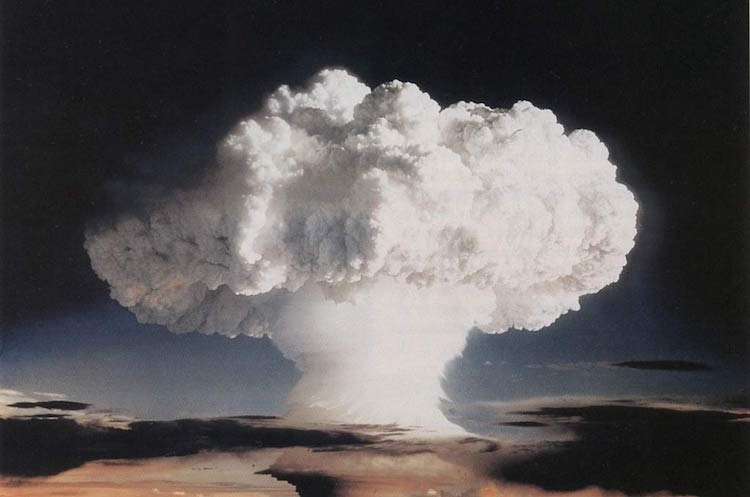By Kim Won-soo
Following are excerpts from remarks by UN High Representative for Disarmament Affairs Kim Won-soo at the opening of the United Nations Conference to negotiate a legally binding instrument to prohibit nuclear weapons, leading towards their total elimination on March 27, 2017. He represented Secretary-General António Guterres who was travelling on official business.
NEW YORK (IDN-INPS) – This conference is taking place against a backdrop of rising international tension, renewed arms competition and an absence of results in disarmament bodies.
The Secretary-General recognized these developments when he recently described our world as one of “new and old conflicts woven in a complex, interconnected web” where “global tensions are rising, sabres have been rattled and dangerous words spoken about the use of nuclear weapons.”
On top of these interconnections are worrying trends that are threatening to undo the gains we have made since the end of the Cold War. This makes the need for a breakthrough all the more urgent.
Two factors are increasingly impeding the ability of the international community to respond effectively.
The first factor is the dismissiveness and defeatism that permeates international deliberations on disarmament. The long paralysis in United Nations disarmament bodies has prompted many to retreat into entrenched and inflexible positions.
This has unfortunately become the new normal. Yet, history has proven that progress on disarmament can only be made when we can pursue inclusive dialogue, respect our differences and listen to each other in a spirit of compromise and flexibility.
The second factor is the diminishing awareness and interest in disarmament issues by the global public. It is hard to imagine these days a gathering of one million people in the street in support of nuclear disarmament, as we saw in the 1980s.
We need to find a new way to inspire and motivate the public in support of disarmament, in the same way that they have been energized to respond to the challenge of climate change, an existential threat facing humanity.
The continued existence of nuclear weapons still poses yet another existential threat to humanity. The need for progress in nuclear disarmament has rarely been as urgent as it is today. The Doomsday Clock, indicating how close humanity is to global catastrophe, has been set at two and a half minutes to midnight as of January this year. This is the worst since 1953 and worse than even at the height of the Cold War.
The emergence and rapid dissemination of advanced new types of weapons and related concepts are increasingly creating a double-blurring of the line, both between strategic and non-strategic weapons and between nuclear and conventional weapons. Also troubling, countries that possess nuclear weapons are spending billions of dollars to modernize their arsenals and to make weapons that are more capable and more useable.
The endless pursuit of nuclear and non-nuclear strategic weapons will not create security. Rather, it has the potential to provoke new and destabilizing arms races and to exacerbate regional and global tensions. These technologies can alter deterrence calculations and may lower the threshold for the use of nuclear weapons, with devastating consequences.
If we are to achieve the total elimination of nuclear weapons, we will ultimately need to reverse these trends. The possession of nuclear weapons, which are linked with the threat of their use, is fundamentally incompatible with humanity’s common aspirations for peace and security.
It will remain difficult to achieve these shared aspirations when countries continue to rely on nuclear weapons in their security doctrines. The strengthening of international norms against nuclear weapons is an important step. To make progress beyond this, we will also need to reflect on the basic objectives of the disarmament process, as they are enshrined in the United Nations Charter.
In this connection, our goals have always been broader than eliminating or restricting problematic types of arms. Disarmament was meant as an integrated approach to address the larger problem of war and to facilitate arrangements for the collective maintenance of international security.
Under the rubric of general and complete disarmament, for the past several decades, Member States have pursued systematic and progressive steps toward this end. This approach has led to important instruments, including the establishment of nuclear-weapon-free zones as well as bans on nuclear testing, various inhumane weapons, anti-personnel landmines and cluster munitions.
In moving forward, I believe we need to find a way to modernize our historical vision of general and complete disarmament and transform it into a new paradigm for sustainable security.
I would like to conclude with three personal hopes.
First, it is my sincere hope that the instrument you are going to negotiate will make a positive and important contribution to nuclear disarmament and to our ultimate objective of general and complete disarmament.
The second hope is that the instrument will also strengthen the Nuclear Non- Proliferation Treaty and advance us closer to the total elimination of nuclear weapons.
Last but not least, I hope that efforts will continue to be made to seek the inclusive engagement of all States. After all, creating a world without nuclear weapons is a common obligation and responsibility that both nuclear and non-nuclear weapon states do share.
In this spirit, let us all work harder and more creatively, so that we can achieve our common goal of a world, safer and more secure, without nuclear weapons, and better for all. [IDN-InDepthNews – 29 March 2017]
Photo: An atmospheric nuclear test conducted by the United States at Enewetak Atoll, Marshall Islands, on 1 November 1952. Photo: US Government
IDN is flagship agency of the International Press Syndicate

